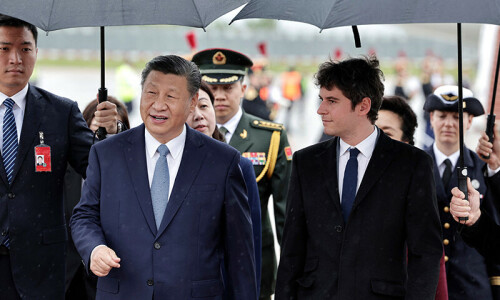ISLAMABAD: Experts on Thursday told the Senate Foreign Affairs Committee that peace in Afghanistan provided a reason to Pakistan and the United States to cooperate, but worried over the lack of clarity in Washington on how to deal with the conflict in the war-torn country.
They were testifying before the Senate body that was holding a public hearing on ‘Pak-US relations: After Foreign Minister’s visit to Washington’. The hearing was presided over by Senator Mushahid Hussain Sayed, chairman of the foreign affairs committee.
Senator Sayed talked of a ‘glimmer of hope’ in the US-Pak ties and a ‘cautious optimism’ on both sides about future of the ties. He was referring to signals from Washington that the US would engage with Taliban in an attempt to find a political settlement of the Afghan conflict.
At the same time he noted that there was still confusion in the US about Afghanistan and the country’s approach towards Taliban.
Former foreign secretary Jalil Abbas Jilani, who had also served as ambassador to the US, said that it would be prudent for Pakistan to establish friendly ties with the US, while pursuing its strategic partnership with the country.
He believed that there was a belated realisation in the US that it needed to re-calibrate its strategy towards Pakistan because the approach it was previously pursuing was not working. He welcomed recent meetings between Pakistan and US leaders and said things were progressing positively.
The vice president of the United States Institute of Peace in Washington, Moeed Yusuf said that the Pak-US relationship was not independent of Afghanistan.
He, therefore, suggested focused conversation, deliberations for developing a common vision, and utilisation of Pakistan’s role for peace in Afghanistan.
Dr Moeed observed that the presence of a full-time foreign minister, who was well-known in the US, had been taken positively in Washington, and the recent visits on both sides had helped the cause well.
He said the two choices before Pakistan were to either believe that the region in future would be divided between two blocs where there would be the US and India on one side and China and Pakistan on the other and to position accordingly or to develop equally good relations with both Washington and Beijing. Pakistan, he said, should explore how it could benefit from the US-China equation instead of falling a victim to their rivalry.
Published in Dawn, October 12th, 2018















































Dear visitor, the comments section is undergoing an overhaul and will return soon.